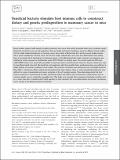Beneficial bacteria stimulate host immune cells to counteract dietary and genetic predisposition to mammary cancer in mice
Author(s)
Lakritz, Jessica; Poutahidis, Theofilos; Levkovich, Tatiana; Chatzigiagkos, Antonis; Mirabal, Sheyla; Alm, Eric J.; Erdman, Susan E.; Varian, Bernard; Ibrahim, Yassin; ... Show more Show less
DownloadLakritz-2013-Beneficial bacteria.pdf (1.220Mb)
PUBLISHER_CC
Publisher with Creative Commons License
Creative Commons Attribution
Terms of use
Metadata
Show full item recordAbstract
Recent studies suggest health benefits including protection from cancer after eating fermented foods such as probiotic yogurt, though the mechanisms are not well understood. Here we tested mechanistic hypotheses using two different animal models: the first model studied development of mammary cancer when eating a Westernized diet, and the second studied animals with a genetic predilection to breast cancer. For the first model, outbred Swiss mice were fed a Westernized chow putting them at increased risk for development of mammary tumors. In this Westernized diet model, mammary carcinogenesis was inhibited by routine exposure to Lactobacillus reuteri ATCC-PTA-6475 in drinking water. The second model was FVB strain erbB2 (HER2) mutant mice, genetically susceptible to mammary tumors mimicking breast cancers in humans, being fed a regular (non-Westernized) chow diet. We found that oral supplement with these purified lactic acid bacteria alone was sufficient to inhibit features of mammary neoplasia in both models. The protective mechanism was determined to be microbially-triggered CD4+CD25+ lymphocytes. When isolated and transplanted into other subjects, these L. reuteri-stimulated lymphocytes were sufficient to convey transplantable anti-cancer protection in the cell recipient animals. These data demonstrate that host immune responses to environmental microbes significantly impact and inhibit cancer progression in distal tissues such as mammary glands, even in genetically susceptible mice. This leads us to conclude that consuming fermentative microbes such as L. reuteri may offer a tractable public health approach to help counteract the accumulated dietary and genetic carcinogenic events integral in the Westernized diet and lifestyle.
Date issued
2014-01Department
Massachusetts Institute of Technology. Department of Biological Engineering; Massachusetts Institute of Technology. Division of Comparative MedicineJournal
International Journal of Cancer
Publisher
Wiley Blackwell
Citation
Lakritz, Jessica R., Theofilos Poutahidis, Tatiana Levkovich, Bernard J. Varian, Yassin M. Ibrahim, Antonis Chatzigiagkos, Sheyla Mirabal, Eric J. Alm, and Susan E. Erdman. “Beneficial Bacteria Stimulate Host Immune Cells to Counteract Dietary and Genetic Predisposition to Mammary Cancer in Mice.” Int. J. Cancer 135, no. 3 (January 10, 2014): 529–540.
Version: Final published version
ISSN
00207136
1097-0215